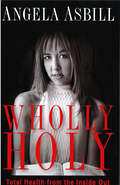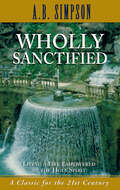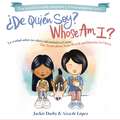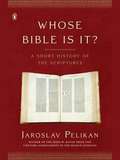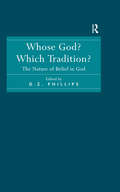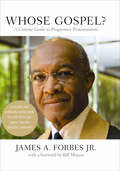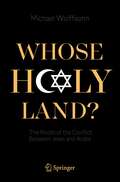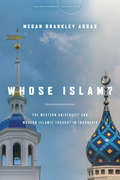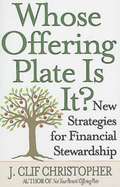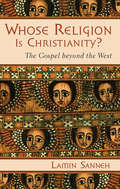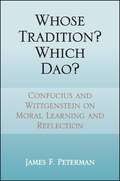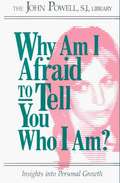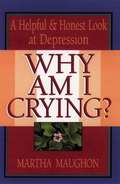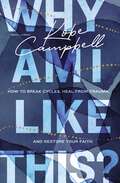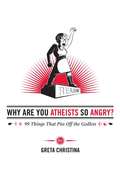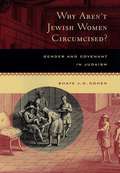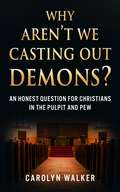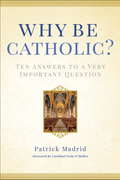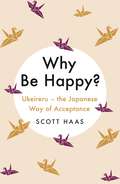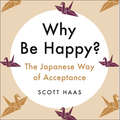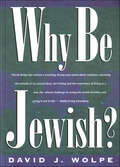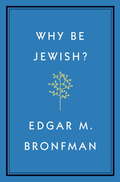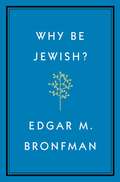- Table View
- List View
Wholly Holy: Total Health From the Inside Out--Body, Mind and Spirit
by Angela AsbillWith thousands of health and diet books hitting the shelves each year, why are people--especially believers--still overweight, unhealthy and sick? It’s rather simple, really: we keep treating symptoms and never deal with the root of the problem. The only way to obtain true victory over any destructive habit is to first deal with the real issue, the heart. Wholly Holy cuts to the heart of the matter, addressing the real issues behind the current health epidemic running rampant among God’s people. In addition to providing information about nutrition and exercise, certified personal trainer Angela Asbill goes beyond the physical aspects of health, reaching deeper into the spirit man to bring freedom from the bondage of food addiction and unhealthy living. Get off the couch, grab your Bible, and get ready to experience a total life transformation from the inside out. This handbook of healthy living, with instructions taken straight from the Word of God, will equip you to enjoy a healthy, Wholly Holy life.
Wholly Sanctified: Living a Life Empowered by the Holy Spirit
by A. B. SimpsonWholly Sanctified was first published in 1890. A.B. Simpson preached these sermons then printed these shortly thereafter. As A. B. Simpson hoped the people would quickly endear themselves to the sanctifying power of the Holy Spirit. Simpson desired to see his congregations to follow full Godhead including the Holy Spirit and search and seek the full indwelling of the Holy Spirit in the sanctifying process within their lives. Based on the hope of true holiness. The chapters of this book are broken down into:Wholly SanctifiedSanctified SpiritA Sanctified SoulA Sanctified BodyPreserved BlamelessEven as HeLegacy in Verse A.B. Simpson stated, "I prayed a long time to get sanctified, sometimes, I thought I had it. On one occasion I felt something, and I held on with a desperate grip for fear it would go, and, of course, it went with the next sensation and the next mood. I lost it because I did not hold onto Him."
Wholly Sanctified: Living a Life Empowered by the Holy Spirit
by A. B. SimpsonWholly Sanctified was first published in 1890. A.B. Simpson preached these sermons then printed these shortly thereafter. As A. B. Simpson hoped the people would quickly endear themselves to the sanctifying power of the Holy Spirit. Simpson desired to see his congregations to follow full Godhead including the Holy Spirit and search and seek the full indwelling of the Holy Spirit in the sanctifying process within their lives. Based on the hope of true holiness. The chapters of this book are broken down into:Wholly SanctifiedSanctified SpiritA Sanctified SoulA Sanctified BodyPreserved BlamelessEven as HeLegacy in Verse A.B. Simpson stated, "I prayed a long time to get sanctified, sometimes, I thought I had it. On one occasion I felt something, and I held on with a desperate grip for fear it would go, and, of course, it went with the next sensation and the next mood. I lost it because I did not hold onto Him."
Whose Am I? (Bilingual) /¿De quién soy? (Bilingüe): The truth about your worth and identity in Christ / La verdad sobre tu valor e identidad en Cristo
by Jackie Darby Aixa de LópezWhose Am I? /¿De quién soy? shares true life experiences about adoption, redemption, and finding our true identity in Christ, while providing opportunities to ask questions and engage in conversations that are often difficult for families to address.In Whose Am I? we meet two characters whose lives are intertwined due to a strong bond formed by their adoption stories: Darly, a pre-adolescent girl with a thousand questions and feelings surrounding her story, and Jackie, her mentor and good friend, who has a beautiful and powerful testimony to share with her. Throughout their interaction, we learn that Jackie was abandoned in a dump and miraculously found by a missionary nurse who took her in an orphanage, which is contacted by a foreign couple wishing to adopt.Whose Am I? is perfect for:Adopted or foster childrenParents of adoptive or foster childrenParents hoping to adoptChildren wanting to understand adoptionStructured in six sections to be read between parents and children, this book features:Bilingual text (English and Spanish)Illustrations by Aixa de López, speaker, author, illustrator and… Darly&’s mom!Reflections and prayersWhose Am I? /¿De quién soy?Whose Am I? /¿De quién soy? comparte experiencias vitales reales sobre la adopción, la redención y la búsqueda de nuestra verdadera identidad en Cristo, al tiempo que ofrece oportunidades para formular preguntas y entablar conversaciones que a menudo resultan difíciles de abordar para las familias.Darly se miró al espejo y se preguntó: &“Realmente, ¿de quién soy?&”. Había muchas cosas que no sabía sobre su propia historia. Cada vez que pensaba en su vida, le parecía un rompecabezas con piezas que faltaban. Ella añoraba conocer y comprender todos los detalles de los primeros días y años de su vida. Deseaba que alguien pudiera contarle la historia completa.En ¿De quién soy? conocemos a dos personajes cuyas vidas están entrelazadas debido a un fuerte vínculo formado por sus historias de adopción: Darly, una niña preadolescente con mil preguntas y sentimientos que rodean su historia, y Jackie, su mentora y buena amiga, que tiene un testimonio hermoso y poderoso que compartir con ella. A lo largo de su interacción nos enteramos de que Jackie fue abandonada en un basurero, donde milagrosamente una enfermera misionera la encontró y la llevó a un orfanato, el cual fue contactado por una pareja extranjera que deseaba adoptar.¿De quién soy? Es perfecto para:Hijos adoptados o de acogidaPadres de hijos adoptivos o acogidosPadres que esperan adoptarNiños que quieren comprender la adopciónEstructurado en seis secciones para ser leído entre padres e hijos, este libro incluye:Texto bilingüe (inglés y español)Ilustraciones de Aixa de López, conferencista, oradora, ilustradora… ¡y mamá de Darly!Reflexiones y oracionesJackie y Aixa, ambas voluntarias de la Alianza Cristiana para los Huérfanos en Latinoamérica, sueñan con muchas más historias de personas que tuvieron orígenes difíciles y han sido redimidas, mientras ayudan a más niños, jóvenes y padres a caminar con gozo y verdad en medio del quebranto y la belleza de la adopción.
Whose Bible Is It?
by Jaroslav PelikanJaroslav Pelikan, widely regarded as one of the most distinguished historians of our day, now provides a clear and engaging account of the Bible's journey from oral narrative to Hebrew and Greek text to today's countless editions. Pelikan explores the evolution of the Jewish, Protestant, and Catholic versions and the development of the printing press and its effect on the Reformation, the translation into modern languages, and varying schools of critical scholarship. Whose Bible Is It? is a triumph of scholarship that is also a pleasure to read. "An engaging and highly readable survey of biblical scholarship that tells a fascinating and complex story. " -The Wall Street Journal"A crisp, remarkably succinct history of the Bible as preserved, interpreted, translated and canonized by the various faiths that believe in it. " -Los Angeles Times"Engaging . . . an excellent overview. " -The New York Times Book Review"Outstanding . . . Pelikan takes the reader through the process of scripture building with a fluency and ease that is both accessible and understandable. " -Publishers Weekly (starred review)"Masterly . . . Pelikan weaves a tapestry of the power of the Word to mold religious communities, nations, and culture. . . . Engaging, concise, and highly readable. " -The Christian Science Monitor
Whose God Rules?
by Nathan C. Walker Edwin J. GreenleeThis book demonstrates that the United States, whether we like it or not, is a theolegal nation - a democracy that simultaneously guarantees citizens the right to free expression of belief while preventing the establishment of a state religion.
Whose God? Which Tradition?: The Nature of Belief in God
by D. Z. PhillipsPhilosophy of Religion is marked by controversy over which philosophical accounts do justice to core religious beliefs. Many Wittgenstinian philosophers are accused by analytic philosophers of religion of distorting these beliefs. In Whose God? Which Tradition?, the accusers stand accused of the same by leading philosophers in the Thomist and Reformed traditions. Their criticisms alert us to the dangers of uncritical acceptance of dominant philosophical traditions, and to the need to do justice to the conceptual uniqueness of the reality of God. The dissenting voices breathe new life into the central issues concerning the nature of belief in God.
Whose Gospel?: A Concise Guide to Progressive Protestantism (Whose Religion? Ser.)
by James A. Forbes Jr.A passionate call to justice from the man Newsweek calls &“one of the twelve most effective preachers in the English-speaking world.&” In Whose Gospel?, one of America&’s greatest living preachers offers a compelling vision of progressive social change. Known as &“the preacher&’s preacher,&” Dr. James A. Forbes Jr. has tirelessly advocated progressive views on the crucial issues of our time—from poverty, war, and women&’s equality to racial justice, sexuality, and the environment. Long a powerful voice for progressive Protestants, Forbes draws on a record of political commitment ranging from the civil rights movement to his stirring address at the 2004 Democratic National Convention, in addition to his eighteen years at the helm of New York City&’s historic Riverside Church. Reflecting on insights of his years as a pastor, a teacher, and an adviser to political leaders, this inspiring manifesto &“for the healing of the nations&” epitomizes the best thinking of one of the country&’s foremost religious leaders. Published with a foreword by longtime Riverside Church member Bill Moyers, Whose Gospel? is a pithy and insightful introduction to Forbes&’s thought and a welcome source of inspiration in this era of hope and change. &“Forbes . . . looks back over his life as a pastor and a black man to make a strong connection between the gospels of Christian faith and life as lived in a dynamic and changing world . . . [He] intersperses passages from the Bible with his experiences to offer a full and compelling look at making faith and humane ideals real in the lives of church members and the nation.&” —Booklist
Whose Holy Land?: The Roots of the Conflict Between Jews and Arabs
by Michael WolffsohnThis book explains the historical roots of the conflict between Jews and Arabs, which has lost none of its explosiveness to the present day, in a comprehensive and easy-to-understand manner. The question of who owns the Holy Land is more relevant today than ever. The debates on this topic are often characterized by ignorance and strong emotions, while partiality and power interests still obscure the view on the political situation in the Middle East. Shaking up old myths and prejudices, this book presents an overall historical as well as political analysis of the Jewish, Christian, and Muslim structures, actors, and actions from the very beginning to this very day, as well as a topical analysis. It combines history with theology and political science. Thus, the book is a must-read for scholars and students of political science, history, and international relations, as well as policy-makers, interested in a better understanding of the historical background and current political situation in the Middle East.
Whose Islam?: The Western University and Modern Islamic Thought in Indonesia (Encountering Traditions)
by Megan Brankley AbbasIn this incisive new book, Megan Brankley Abbas argues that the Western university has emerged as a significant space for producing Islamic knowledge and Muslim religious authority. For generations, Indonesia's foremost Muslim leaders received their educations in Middle Eastern madrasas or the archipelago's own Islamic schools. Starting in the mid-twentieth century, however, growing numbers traveled to the West to study Islam before returning home to assume positions of political and religious influence. Whose Islam? examines the far-reaching repercussions of this change for major Muslim communities as well as for Islamic studies as an academic discipline. As Abbas details, this entanglement between Western academia and Indonesian Islam has not only forged powerful new transnational networks but also disrupted prevailing modes of authority in both spheres. For Muslim intellectuals, studying Islam in Western universities provides opportunities to experiment with academic disciplines and to reimagine the faith, but it also raises troubling questions about whether and how to protect the Islamic tradition from Western encroachment. For Western academics, these connections raise pressing ethical questions about their own roles in the global politics of development and Islamic religious reform. Drawing on extensive archival research from around the globe, Whose Islam? provides a unique perspective on the perennial tensions between insiders and outsiders in religious studies.
Whose Offering Plate Is It?: New Strategies for Financial Stewardship
by J. Clif ChristopherIn Not Your Parents' Offering Plate, Clif Christopher challenged churches and pastors to take a lesson from the leaders of not-for-profit organizations: if you want people to give to your church, first offer them a compelling vision of the good that their giving will accomplish. The book encouraged an entire culture change for many in the Christian community in how they viewed the offering plate. It also unleashed a barrage of questions on specifically how to create this new culture while maintaining the foundations of one's faith tradition and mission.In this sequel, Christopher responds to these questions in the same forthright manner that he originally laid forth his propositions. He offers simple, strategic advice on such difficult questions as:“Exactly how do I go about gaining access to the donor records when my church has prohibited it for a hundred years?”“How do I explain a meeting with just those who are strong givers without alienating those who are not?”“How can we advocate online giving without encouraging some to abuse their credit cards?”“What should letters to different giving constituencies look like?”
Whose Religion Is Christianity?: The Gospel beyond the West
by Lamin SannehMany historians of religion now recognize that Christianity is a global faith whose most vibrant expression and growth are found today in the non-Western world. But no one explores this reality and its implications for modern life with the depth of learning and personal insight of Lamin Sanneh.This book is unique in the literature of world Christianity, not least for its novel structure. Sanneh's engaging narrative takes the form of a self-interview in which he asks questions about the cross-cultural expansion of Christianity and provides insightful answers and meaningful predictions about the future. This technique also allows Sanneh to track developments in world Christianity even while giving attention to the responses and involvement of indigenous peoples around the world.Sanneh's own background and lifelong involvement with non-Western cultures bring a richness of perspective not found in any other book on world Christianity. For example, Sanneh highlights what is distinctive about Christianity as a world religion, and he offers a timely comparison of Christianity with Islam's own missionary tradition. The book also gives pride of place to the recipients of the Christian message rather than to the missionaries themselves. Indeed, Sanneh argues here that the gospel is not owned by the West and that the future of the tradition lies in its "world" character.Literate, relevant, and highly original, Whose Religion Is Christianity? presents a stimulating new outlook on faith and culture that will interest a wide range of readers.
Whose Tradition? Which Dao?: Confucius and Wittgenstein on Moral Learning and Reflection (SUNY series in Chinese Philosophy and Culture)
by James F. PetermanIn an incisive work of comparative philosophy, James F. Peterman considers the similarities between early Chinese ethicist Confucius and mid-twentieth century philosopher Ludwig Wittgenstein. Their enduring legacies rest in no small part on projects to restore humanity to healthy ways of living and thinking. Confucius offers a method of answering ethical questions designed to get his interlocutors further along on the Dao, the path of right living. Struggling with his own forms of unhealthy philosophical confusion, Wittgenstein provides a method of philosophical therapy designed to help one come into agreement with norms embedded in our forms of life and speech. Highlighting similarities between the two philosophers, Peterman shows how Wittgensteinian critique can benefit from Confucian inquiry and how Confucian practice can benefit from Wittgensteinian investigations. Furthermore, in presenting a way to understand Confucius's Dao as concrete language games and forms of life, and Wittgenstein's therapeutic interventions as the most fitting philosophical orientation toward early Confucian ethics, Peterman offers Western thinkers a new, sophisticated understanding of Confucius as a philosopher.
Why Am I Afraid to Tell You Who I am?
by John PowellThere are many reasons for being afraid to tell others who we really are. We're often taught to put on an act when around other people. This book shows you how you can overcome the fear of revealing your true self to others.
Why Am I Crying?: A Helpful & Honest Look at Depression
by Martha MaughonAn honest, helpful, I-have-been-there look at depression. Martha Maughon writes encouragingly of God's grace and human weakness.
Why Am I Like This?: How to Break Cycles, Heal from Trauma, and Restore Your Faith
by Kobe CampbellWhy does our past pain continue to affect our present?Though many of us can point to patterns of brokenness in our lives, we don&’t know why they're there. No matter how hard we work, we can&’t seem to outrun the very things that break our hearts. That's because our everyday setbacks are rooted in our unaddressed wounds.In Why Am I Like This? seminary-trained, licensed trauma therapist Kobe Campbell helps us understand why it&’s so hard to break these patterns as she offers us a deeper understanding of how our past shapes our present. With tender wisdom, rare vulnerability, and profound honesty, Kobe reminds each reader that they&’re not alone, empowering them to step into healing with evidence-based, faith-filled coping skills and resources.In Why Am I Like This?, you will:gain an understanding of what trauma and healing really are,explore the roots of your dysfunctional patterns,learn how your trauma shows up in your everyday life, andfind trauma-informed, faith-based coping mechanisms to heal your mind and deepen your intimacy with God.Kobe marries theological insight with therapeutic principles to give readers the tools and insights needed to begin their journey of restoration.
Why Are You Atheists So Angry?: 99 Things That Piss Off The Godless
by Greta ChristinaWhy are atheists angry? Is it because they're selfish, joyless, lacking in meaning, and alienated from God? Or is it because they have legitimate reasons to be angry--and are ready to do something about it? Armed with passionate outrage, absurdist humor, and calm intelligence, popular blogger Greta Christina makes a powerful case for outspoken atheist activism, and explains the empathy and justice that drive it. This accessible, personal, down-to-earth book speaks not only to atheists, but also to believers who want to understand the so-called new atheism. Why Are You Atheists So Angry? drops a bombshell on the destructive force of religious faith—and gives a voice to millions of angry atheists.
Why Aren't Jewish Women Circumcised? Gender and Covenant in Judaism
by Shaye J. D. CohenWith a lively command of a wide range of Jewish sources--from the Bible and the Talmud to the legal and philosophical writings of the Middle Ages to Enlightenment thinkers and modern scholars--Shaye J. D. Cohen considers the varied responses to this provocative question and in the process provides the fullest cultural history of Jewish circumcision available.
Why Aren’t We Casting Out Demons?: An Honest Question for Christians in the Pulpit and Pew
by Carolyn WalkerAre you ready to rise in your God-ordained authority and deal a mighty blow to the enemy?In a world where spiritual battles rage, why do so many Christians remain powerless against the forces of darkness? Carolyn Walker’s “Why Aren’t We Casting Out Demons?” illuminates this critical issue, calling believers to rise in their God-given authority and bring deliverance to the suffering.Drawing from personal experiences and biblical study, Carolyn Walker uncovers a concerning reality: demonic spirits are actively assaulting people, yet many church leaders and congregants are unprepared, hesitant, or unwilling to confront them. This book challenges Christians to step into their role as spiritual warriors.As a seasoned pastor, Carolyn Walker has witnessed the church’s reluctance to tackle demon deliverance. She addresses common misconceptions, fears, and the often-ignored biblical mandate to cast out demons. This book is not just a critique but a roadmap for resurrecting this essential aspect of Christian ministry.Carolyn Walker equips readers with scriptural insights and practical steps to confront and expel demonic forces. By embracing this authority, Christians can transform their lives, families, churches, and communities.About the AuthorPastor Carolyn Walker is a minister of the gospel and a missionary. She has served in various countries including Haiti, Mexico, Santo Domingo, Honduras, Albania, Jamaica, Hong Kong, Singapore, and the Bahamas. She has been instrumental in building churches in Central America and financially supports the feeding of hundreds of children a day in Copan, Honduras.From 2002 to 2008, Pastor Carolyn was co-founder and co-pastor of Word of Faith Ministries in Sanford, Florida. After retiring as an Officer in the United States Air Force she served as a minister and pastor on staff at mega churches in Denver, Colorado and Orlando, Florida.
Why Be Catholic?: Ten Answers to a Very Important Question
by Patrick Madrid Cardinal Seán O'MalleyThe popular blogger and publisher of Envoy magazine offers 10 key reasons why he loves being Catholic (and you should too). Drawing heavily on poignant anecdotes from his own experience as a life-long Catholic born in 1960s, Madrid offers readers a way of looking at the Church--its members, teachings, customs, and history--from perspectives many may have never considered.Growing up Catholic during a time of great social and theological upheaval and transition, a time in which countless Catholics abandoned their religion in search of something else, Patrick Madrid learned a great deal about why people leave Catholicism and why others stay. This experience helped him gain many insights into what it is about the Catholic Church that some people reject, as well as those things that others treasure. Drawing upon Madrid's personal experiences, Why Be Catholic? offers a deeply personal, fact-based, rationale for why everyone should be Catholic or at least consider the Catholic Church in a new light.
Why Be Happy?: The Japanese Way of Acceptance
by Scott HaasThis book offers a path to well-being and satisfaction for the anxious and exhausted and anyone charmed by concepts such as hygge, ikigai, and wabi sabi. Psychologist Scott Haas spends much of his time in Japan, and with this book he provides a host of delightful examples of the way he has been made welcome, accepted and happy in this distant country, as well as many thought provoking and practical lessons which you can apply.WHY BE HAPPY? will help make your world a happier place by discovering a place of contentment and peace amid the chaos of modern life.
Why Be Happy?: The Japanese Way of Acceptance
by Scott HaasThis book offers a path to well-being and satisfaction for the anxious and exhausted and anyone charmed by concepts such as hygge, ikigai, and wabi sabi. Psychologist Scott Haas spends much of his time in Japan, and with this book he provides a host of delightful examples of the way he has been made welcome, accepted and happy in this distant country, as well as many thought provoking and practical lessons which you can apply.WHY BE HAPPY? will help make your world a happier place by discovering a place of contentment and peace amid the chaos of modern life.(P)2020 Hachette Audio
Why Be Jewish?
by David J. Wolpe"All beginnings require that you unlock new doors."--Rabbi Nachman of BratslavIn this short and inspiring text, Rabbi David J. Wolpe addresses all who seek to enlarge the spiritual side of their lives. For those considering a return to the faith of their forebears, for those drawn to conversion, Why Be Jewish? is a learned, graceful, and welcoming introduction beckoning readers into the heart of this venerable and enduring religion.
Why Be Jewish?: A Testament
by Edgar BronfmanThoughtful, piercing, and sincere, Why Be Jewish? is Edgar Bronfman's passionate testimonial to his own personal Jewish journey and the story of the Jewish people.This is the late Edgar Bronfman's clarion call to a generation of secular, disaffected and unaffiliated Jews, addressing the most critical question confronting Judaism worldwide.Completed in December 2013, just weeks before he passed away, Why Be Jewish? expresses Canadian billionaire and philanthropist Edgar Bronfman's awe, respect, and deep love for his faith and heritage. Bronfman walks readers through the major tenets and ideas in Jewish life, fleshing out their meaning and offering proof texts from the Jewish tradition, gleaned over his many years of study with some of the greatest teachers in the Jewish world. In Why Be Jewish?, with honest, poignancy, and passion, Bronfman shares insights learned from his own personal journey and makes a compelling case for the meaning and transcendence of a secular Judaism that is still steeped in deep moral values, authentic Jewish texts, and a focus on deed over creed or dogma.From the Hardcover edition.
Why Be Jewish?: A Testament
by Edgar BronfmanEdgar M. Bronfman's clarion call to a generation of secular, disaffected, and unaffiliated Jews, this book addresses the most critical question confronting Judaism worldwide. Completed in December 2013, just weeks before he passed away, WHY BE JEWISH? expresses Edgar Bronfman's awe, respect, and deep love for his faith and heritage. Bronfman walks readers through the major tenets and ideas in Jewish life, fleshing out their meaning and offering proof texts from the Jewish tradition gleaned over his many years of study with some of the greatest teachers in the Jewish world. With honesty, poignancy, and passion, Bronfman shares In WHY BE JEWISH? insights gleaned from his own personal journey and makes a compelling case for the meaning and transcendence of a secular Judaism that is still steeped in deep moral values, authentic Jewish texts, and a focus on deed over creed or dogma.
